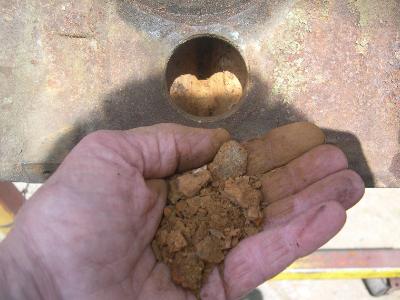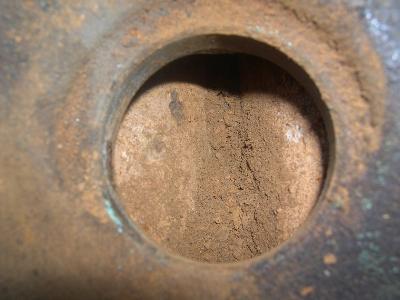|
By DANIEL TINDER - 2 Years Ago
|
Getting ready to install new aluminum radiator. Yellow premium coolant is less than a year old, and though already filtered thru a plastic coffee screen, it is still a very dark rusty-brown. Hate to dump it (quite expensive) since the old block (and retained coolant) will likely just discolor any new coolant also. But, if the micro-rust is apt to eventually adhere & accumulate in the radiator passages (and restrict flow), might possibly be worth the expense to minimize risk of any future negative consequences (?). Opinions?
P.S. BTW:, also installing an inline hose filter/screen device.
|
|
By KULTULZ - 2 Years Ago
|
"Yellow premium coolant is less than a year old, and though already filtered thru a plastic coffee screen, it is still a very dark rusty-brown."
Who is the maker (and PN) of the coolant and why did you choose yellow? Do you have aluminum engine parts - intake - cyl heads - front cover?
If the coolant is now rusty brown, you will need a cleaner and complete flush or it will turn again.
|
|
By 55blacktie - 2 Years Ago
|
These old engine blocks are notorious for rust buildup, particularly towards the back cylinders; it can be one of the main causes of overheating. When an engine is torn down for a rebuild, the blocks need to be thoroughly cleaned to eliminate the rust; a coat hanger is often one of the tools used. This could explain why your green coolant turned brown within a year.
There could be another explanation, but it might not be plausible. Are you color-blind? I'm joking, but years ago, I had a friend who could not differentiate green from brown.
|
|
By KULTULZ - 2 Years Ago
|
  Did the ALUM RAD MANUFACTURE call for type of coolant?
|
|
By DANIEL TINDER - 2 Years Ago
|
Amsoil propylene glycol (yellow/70%). I like it mainly for it’s sealing effect (leaky steel head gasket). Block has been flushed, but unfortunately, rust is an ongoing process (especially since I run an open/zero pressure system). Even if there was a way to clean the cooling passages down to bare, shiny iron, with air & the 30% water, new coolant would soon be brown again.
Upon reflection, I may have underestimated the age, and likely re-using it would be a false economy regardless. I have to wonder how much rust the 70 yr. old radiator may have retained also, contributing to the discoloration. IT too had been chemically flushed over the years, but how well does rust adhere to brass, and how much did the circulatory flow play toward dislodging accumulation. Guess I’ll find out after the new radiator has been in service awhile. The hose filter will likely be adequate protection to keep it properly functioning (rebuilt/hi-po motor waiting in the wings will need max cooling).
|
|
By 55blacktie - 2 Years Ago
|
|
When I inherited my 55 Tbird, it still had the original radiator (12-54). Although it didn't leak, I removed the cap and could clearly see that the core was rotten. I replaced it with a US Radiator heavy-duty 4-row copper & brass radiator. At the time, re-coring it would have cost as much as a new radiator. Re-coring the heater core would have cost more than the cost of a new heater core.
|
|
By KULTULZ - 2 Years Ago
|
|
Block has been flushed, but unfortunately, rust is an ongoing process (especially since I run an open/zero pressure system).
OPEN/ZERO PRESSURE?
Depending on how much sediment (hardened from engine heat and caught in tight passages turns) is in the engine block, and as it keeps breaking down, the coolant will always be compromised (particulates).
You have a BIRD, correct?
|
|
By KULTULZ - 2 Years Ago
|
Maybe consider a cheaper cost coolant until either the system is cleaned or the discolor eases -
https://prestone.com/product/prestone-all-vehicles-antifreezecoolant-ready-to-use/
Just make sure whatever product you choose is aluminum/iron compatible.
|
|
By cokefirst - 2 Years Ago
|
|
I am not sure if there is a chemical change, but I owned a service station in the late 1960's. At the time, many folks would not go to the expense of maintaining 50/50 antifreeze mixture in their vehicles and opted for plain water. As you can guess, the water in these cooling systems was the color of brown rust and some of it was even thick from so much rusty contamination. I used to sell a product made by Justice Brothers called called "Radiator Rust Inhibitor and Water Pump Lubricant". It was a milky white substance and I would put it in cars where the customer did not want to spend the money on doing the job correctly (flushing the system and putting in 50/50 coolant). I am not a proponent of most additives and believe that they need to be tested for benefit. However, I was absolutely amazed at the results of this product. 1 can would clear the liquid in a cooling system to what appears to be clear water in about a week. I think the same product was sold by Solder Seal, Dri Power and other chemical companies. I purchased some current Solder Seal product and noticed that the color is a goldish brown color and not the old white. It does not seem to work as well. I assume there was something harmful in the original formula, but all I know is that it worked.
|
|
By DANIEL TINDER - 2 Years Ago
|
You must have been located in a warm climate area. Since plain (distilled) water is a more effective coolant, that additive was likely all they needed if it never freezes there.
BTW: I LOVE the transparent coolant filter assembly I installed. Nice to visualize the color & flow. Not concours orig., but a worthwhile upgrade (IMO). No debris to speak of accumulated on the screen as yet, so new alum. radiator is likely well protected.
|
|
By DANIEL TINDER - 2 Years Ago
|
DANIEL TINDER (11/27/2024)
BTW: I LOVE the transparent coolant filter assembly I installed. Nice to visualize the color & flow. Not concours orig., but a worthwhile upgrade (IMO). No debris to speak of accumulated on the screen as yet, so new alum. radiator is likely well protected.
BTW: Some recent discussion on the ‘Vintage’ forum re: interaction of aluminum radiators & iron blocks has me wondering. Possibly, more frequent coolant changes (even using propylene) are likely indicated (?). How well do the alum. rads. hold up over time, (considering the ‘dissimilar metals’ issue) ?
|
|
By Joe-JDC - 2 Years Ago
|
|
Whenever you use aluminum heads, intake manifold, water pump, and/or aluminum radiator, you should change the antifreeze to one that is formulated for aluminum products. It will be a different color from typical green antifreeze. Joe-JDC.
|